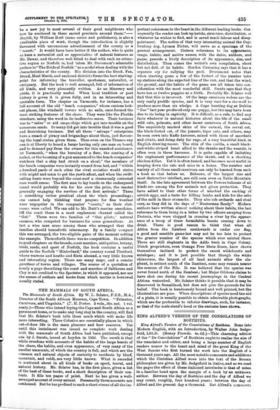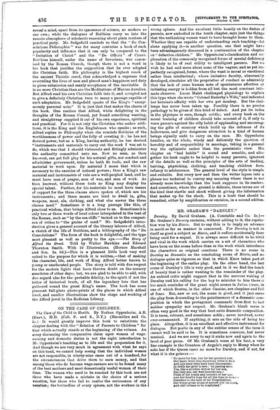KING ALFRED'S VERSION OF rah CONSOLATIONS OF BORTHI13S.
King Alfred's Version of the Consolations of Boithius. Done into Modern English, with an Introduction, by Walter John Sedge- field, Litt.D. (Henry Frowde. 4e. Gd.)—This charming edition of the "De Consolatione " of Boethius ought to realise the aim of the translator and editor, and bring a large number of English readers nearer to the heart and mind of the great King of the West Saxons who first turned the work into the English of a thousand years ago. All the most notable comments and additions which the Christian Alfred wove into the text of the Roman philosopher are given by Mr. Sedgefield in italics, and as we read the pages the effect of these italicised interludes is that of notes in a familiar hand upon the margin of a book by an unknown author. Between the day of Boethius and the day of Alfred we may count, roughly, four hundred years ; between the day of Alfred and...the present day a thousand. But Alfred's comments
reveal a mind, apart from its ignorance of science, as modern as our own; while the dialogues of Boethius carry us into the remote atmosphere of scholastic reasoning about plain matters of practical piety. Mr. Sedgefield reminds us that the "De Con- solatione Philosophie3" was for many centuries a book of such popularity and influence that it can only be compared to the "Imitation of Christ" and the "De Officiis " of Cicero. Boethius himself, under the name of Severinus, was canon- ised by the Roman Church, though there is not a word in his book that justifies the supposition that he ever adopted the Christian faith. His philosophy is the highest reach of the ancient Theistic creed, that acknowledged a supreme God overruling the lives of men and placed man's happiness and duty in pious submission and manly acceptance of the inevitable. It is no more Christian than are the Meditations of Marcus Aurelius. But Alfred read his own Christian faith into it, and scrupled not to give a definitely Christian turn to many a passage capable of such adaptation. Mr. Sedgefield speaks of the King's "anony- mously personal note." It is just that that makes the charm of the book. One realises that Alfred, while delighting in the thoughts of the Roman Consul, yet found something wanting, and straightway supplied it out of his own experience, spiritual and practical. For it is not only the Christian who makes addi- tions, it is the King and the Englishman who speaks ; as such, Alfred replies to Philosophy when she reminds 13oethius of the worthlessness of power and the folly of coveting it : he has not desired power, but as a King, having authority, he has desired "instruments and materials to carry out the work I was set to do, which was that I should virtuously and fittingly administer the authority committed unto me. Now no man, as thou knewest, can get full play for his natural gifts, nor conduct and administer government, unless he hath fit tools, and the raw material to work upon. By material I mean that which is necessary to the exercise of natural powers ; thus a King's raw material and instruments of rule are a well-peopled land, and he must have men of prayer, men of war, and men of work. As thou knowest, without these tools no King may display his special talent. Further, for his materials he must have means of support for the three classes above spoken of, which are his instruments ; and these means are land to dwell in, gifts, weapons, meat, ale, clothing, and what else soever the three classes need." Sometimes it is a long passage like this, of practical wisdom, that brings Alfred close to us. Sometimes it is only two or three words of local colour interpolated in the text of the Roman, such as "by the sea-cliffs" tacked on to the compari- son of riches to "the grains of sand." Mr. Sedgefield's intro- duction gives a general account of the literary labours of Alfred, a sketch of the life of Boethius, and a bibliography of the "De Consolatione." The form of the book is delightful, and the type most pleasant as well as pretty to the eye.—The Story of Alfred the Great. Told by Walter Hawkins and Edward Thornton Smith. With 10 Illustrations. (Horace Marshall and Son. 2s. 6d.)—This is a pleasant little book very well suited to the purpose for which it is written,—that of making the character, life, and work of King Alfred better known to
young or uneducated people. The story is told with due respect for the modern lights that have thrown doubt on the nursery anecdotes of other days; but, we are glad to be able to add, with due regard also for the probable fidelity, to the spirit if not the letter of historical truth, of all the legendary lore that has gathered round the great King's name. The book has some pleasant full-plate photo-prints of the places in which Alfred lived, and smaller illustrations show the shape and working of the Alfred jewel in the Bodleian Library.



















































 Previous page
Previous page